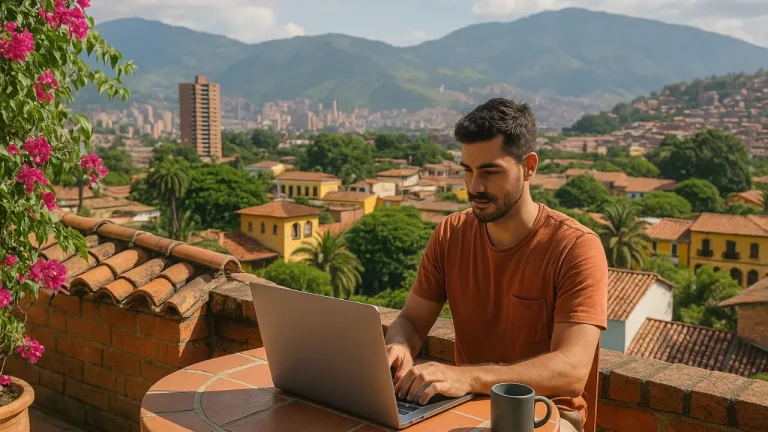🇭🇷 Croatia Digital Nomad Visa: How to Apply in 2025
Croatia’s digital nomad visa offers a scenic 12-month escape in 2025, but navigating income rules, paperwork, and entry timing requires smart planning.

With its Mediterranean coastline, medieval towns, and fast internet, Croatia has quickly become a favorite for digital nomads. Its Digital Nomad Visa, introduced as a temporary stay permit in 2021, allows up to 12 months of legal residence, with no option for extension within the same application cycle.
Beyond the beaches and Instagram shots lies a layered application process, including income thresholds and paperwork that can trip up even seasoned nomads. This 2025 guide walks you through how to apply, what to expect, and how to avoid common pitfalls.
What Is the Croatia Digital Nomad Visa?
Croatia’s Digital Nomad Visa is not technically a visa but a temporary residence permit designed for remote professionals working for non-Croatian companies or as freelancers. It was created to support remote workers and their families while boosting Croatia’s local economy and nomad infrastructure.
What Makes It Stand Out:
- Stay up to 12 months
- Tax exemption on foreign-earned income (as long as you don’t work for local clients)
- Family-friendly, allowing spouses and dependents with increased income proof
- Affordable living compared to many EU countries
Eligibility Criteria (Updated for 2025)
To apply for the Croatia Digital Nomad Visa in 2025, you must meet the following:
- Remote work: Must be employed by or run a business for clients based outside Croatia.
- Minimum income:
- €2,557.40/month (approximately $2,700 USD)
- Or a bank balance of €30,688.80 for a 12-month stay
- Valid health insurance that covers your entire stay
- Clean criminal record, apostilled if needed
- Proof of accommodation (e.g., lease agreement, hotel reservation)
- Recent passport-sized photo and valid passport (at least 3 months beyond stay)
Bringing family? You’ll need to increase your funds by 10% per dependent and provide legal proof (e.g., marriage certificate or child’s birth certificate).
Application Process (Before or After Arrival)
You can apply for this permit before arriving in Croatia (through a consulate) or after entry (at a local police station if you’re visa-exempt).
Step-by-Step Guide:
- Determine Entry Status
- If visa-free: You can apply in Croatia or abroad
- If not: Apply for a D-visa and residence permit via consulate
- Gather Required Documents
- Completed application form (Form 1a)
- Passport (valid for 3+ months beyond your stay)
- Proof of income (bank statements, contract, etc.)
- Health insurance
- Clean criminal record (translated and apostilled if required)
- Accommodation proof
- Letter explaining your remote work situation
- Passport photo (35×45 mm)
- Submit Your Application
- Online via Croatian Ministry of Interior portal
- Or in person at a consulate or police station in Croatia
- Pay the Fees
- Embassy/Consulate Path:
- Residence: €60
- Visa: €100
- Residence Card: €41.14
- In-Country Path:
- Residence: €46.45
- Card: €31.85
- Admin fees: €9.29
- Embassy/Consulate Path:
- Wait for Processing
- Typically 20–30 days
- Can take longer if documents are incomplete or require verification
- Enter and Register
- Once approved, register your address within 3 days of arrival at a local police station
- You’ll receive your biometric residence card shortly after
Visa Duration and Renewal
- Initial stay: 12 months
- Extension: Not available; you must leave Croatia for 90 days before reapplying
- Total stay: Up to 12 months per application cycle
Carry your residence card at all times. It’s proof of legal stay.
Tax Implications
One of the biggest perks of Croatia’s digital nomad program is its tax-friendly structure:
- No tax on foreign-earned income
- Local income is taxable (e.g., if you freelance for Croatian clients)
- Passive income (investments, rental income, certain crypto trades) may be taxed
Double-check your situation with a tax professional familiar with Croatian tax treaties.
Common Pain Points (and How to Overcome Them)
| Pain Point | How to Navigate It |
|---|---|
| High income requirement | Budget wisely or apply with sufficient savings proof |
| Document translations/apostilles | Use licensed services and prepare early |
| Limited embassy support | Rely on verified sources (e.g., ExpatInCroatia) or services like Nomads Embassy |
| Processing delays | Apply early and avoid non-refundable bookings |
| Family complications | Plan extra income requirements and gather legal family documents |
| Application confusion | Use community forums or reputable relocation services for guidance |
Life in Croatia as a Digital Nomad
- Cost of Living:
- Rent (studio, city center): ~$600/month
- Lunch: ~$10
- Public transport: Cheap and reliable
- Internet: High-speed fiber in most cities
- Top Nomad Cities:
- Zagreb: Urban, cultural capital
- Split: Coastal, relaxed vibe
- Rovinj and Dubrovnik: Scenic but pricier
- Community: Active digital nomad hubs, coworking spaces, and events
From Application to Arrival: A User Journey
- Research: Compare visa options, income rules, and lifestyle fit
- Prepare: Gather and translate documents, budget for fees
- Apply: Online or at consulate; pay fees
- Wait: 20–30 days, possibly longer
- Enter Croatia: Register your address
- Settle In: Get your residence card, SIM card, and coworking pass
- Exit or Reapply: Leave after 12 months or reapply after 90 days
How This Article Was Researched
This article is based on verified 2025 updates from the Croatian Ministry of the Interior, Nomads Embassy, and international news reports from sources like NBC News and Travel and Tour World. It also incorporates real-world insights from visa applicants on platforms like Reddit, VisaGuide.World, and Expat in Croatia, highlighting common challenges and practical advice. All figures and requirements, including income thresholds and processing times, have been fact-checked for accuracy as of May 17, 2025. This guide is written to help remote workers confidently navigate Croatia’s evolving digital nomad visa process.
Final Thoughts
Croatia’s digital nomad visa stands out in 2025 as a relatively affordable, tax-friendly, and lifestyle-rich option for remote workers. With a 12-month stay and access to top-tier digital infrastructure, it’s ideal for nomads looking for a European base. Still, paperwork, income proof, and embassy navigation require patience and planning.
If you’re ready to trade Zoom calls for Adriatic views, Croatia may be your next remote HQ. Just come prepared with a scanner, a notarized letter, and a bit of Balkan persistence.
Frequently Asked Questions (FAQs)
What is the maximum duration of the Croatia Digital Nomad Visa in 2025?
The Croatia Digital Nomad Visa allows a maximum stay of 12 months. It cannot be extended beyond this period. To reapply, you must leave Croatia for 90 days before submitting a new application.
Can I apply for the Croatia Digital Nomad Visa while already in Croatia?
Yes, citizens of visa-exempt countries can apply from within Croatia at a local police station. Others must apply from abroad through a Croatian embassy or consulate before entering.
Do I have to pay taxes in Croatia on foreign income while on this visa?
No, foreign-earned income is not taxed in Croatia while on the Digital Nomad Visa. However, income earned from Croatian clients or companies may be subject to local taxation.
What is the minimum income required for the Croatia Digital Nomad Visa in 2025?
To be eligible, applicants must show a minimum monthly income of €2,557.40 or a savings balance of €30,688.80 for a 12-month stay. An additional 10% is required for each dependent included in the application.






